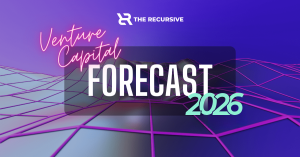Over the past decade, the startup ecosystem in Greece has achieved significant growth and development. A notable testament to how the ecosystem has developed is the emergence of two unicorns, VivaWallet and PeopleCert in 2022 – and such success stories only serve to showcase the country’s entrepreneurial potential. But who are the people behind this growth, and ones that are working on Greek startup legislation and make the ecosystem tick?
With an illustrious background in private equity, Aristos Doxiadis has played a pivotal role in transforming the Greek startup ecosystem.
His investments in technology startups with Openfund, as well as growth companies in industries ranging from table grapes and healthcare to logistics and banking software with Commercial Capital and Eikon Capital, have helped Greece’s ecosystem develop to where it is right now.
Not content with merely investing, Doxiadis is also recognized as a prominent analyst of the Mediterranean country’s economy and society, with his insights and expertise being often sought after in management consulting and public policy advice.
In this exclusive interview with The Recursive, Doxiadis shares the milestones, challenges, and lessons that he learned throughout his career, as well as the extensive focus that Big Pi Ventures, where he is a founder, has had on the healthcare industry and its efforts to modernize it. Finally, he discusses how the Greek startup legislation has evolved and what comes next for the country.
The Recursive: Big Pi Ventures has invested in a diverse range of industries, from data analytics, IoT, and healthcare. How do you identify promising investment opportunities across such varied sectors?
Aristos Doxiadis: Most of our deal flow comes inbound, we have a website and we’ve got hundreds and hundreds of applications. However, most of the deals that we actually did were not inbound in that sense, but it was through our network. They either will be introduced by successful businessmen we know or by people in universities abroad, MIT, or Stanford, that introduce them to us.
So, the initial contact is usually through people that we know and trust. Then we have to do the assessment of whether this is something worth investing in. There are also the sectoral criteria – first of all, at Big Pi I, we decided that we would not be doing B2C, but only B2B, and deep tech in particular.
We also decided that we would not invest in companies unless they had substantial intellectual property, either in the form of patents or in the form of software products that had taken a long time to develop. We put a lot of emphasis on the technology behind the product.
Because there is a diverse investment portfolio, we often needed advice and we got that from people that were very open to give us that advice – mostly people from the diaspora or people in tech companies, either small or large tech companies in the US or people in leading universities that were very open to look at the pitch deck and tell us what they think about it. This really helped us, and this is more or less how we identify and how we screen investments.
One of the startups you have invested in from the healthcare sector is PD Neurotechnology, which provides patients with wearables and also an advanced AI software. How do you see the intersection of AI with healthcare developing over the next period?
Healthcare is important for us – seven of the 22 companies we have invested in are healthcare. And there are different types – some are medical devices, one is diagnostics based on blood samples. Some are bioinformatics, and one is a patient-facing medical advice platform.
PD Neurotechnology has both the hardware and data. So it’s a device that somebody who’s suffering from Parkinson’s can wear at home for a few hours. They don’t need to wear it all the time and it helps their physician from afar to know what are the effects of the drugs they are taking because drugs for Parkinson’s have a lot of side effects, and therefore you’d need to adjust the dosage.
I think this is a good example of how a small country can produce something that is globally competitive – you have people with domain expertise and in this case there were two professors, one who is a specialist in Parkinson’s disease, and the other who is a very high caliber electrical engineer. Together they designed the idea, which performs very well on the European markets.
So this is something which is a very narrow focus type of device that is not competing with wearables, but it’s much more focused on a target market that needs deeper understanding. And this is the kind of successful startups that can come out from Greece.
Aside from Greece, you have also invested across Europe and in the US. What is your criteria when it comes to geographical location?
Our mandate at both Big Pi Ventures I and at the new fund is that because we have public sector money as part of our total funding, it comes attached with one condition that the companies we invest in should have a substantial Greek component, meaning it should have much of the headcount situated in Greece.
However, because Greece has this advantage of a very successful diaspora, we invested a lot of our capital into companies where the founders were in New York, or in Switzerland or wherever. And as soon as we invested, they agreed to set up a team in Greece.
So, we have this dual geography as we call it – usually product development and R&D is in Greece, while business development and sales is in some big metropolitan center in the West. About half of our portfolio in Big Pi I was of that kind, and I think more than half of our portfolio at the new fund will probably be like this as well. And this is how we manage to be both global and local.
You recently announced the second fund worth €50M for investing in deep tech startups. What direction is Big Pi Ventures taking with the new fund?
We will continue with B2B and most of it will be deep tech – but not necessary, we will be doing some business process investing which by now with machine learning technology has become standard so it’s not deep tech anymore because most of the platforms can help you build this quickly. But you need to have expertise in a vertical in the market.
We’re looking for domain expertise in particular sectors, and I’m always talking about global markets. So it is either domain expertise in the target market, or we’re looking for very substantial intellectual property that cannot be easily copied. It’s one of the two, ideally both – but you need to have at least one.
As for the industries – anything that has to do with medical and healthcare will be central to our attention. Also, Industry 4.0, i.e. technologies that transform manufacturing and logistics. And one other field, which up to now we have not touched is clean tech, and this is one area where we really want to learn about because we’re not experts, but we are quick learners. And as I said before we like to get advice from various specialists in the field.
What role can governments and policymakers play in supporting and nurturing entrepreneurship? How has Greek startup legislation evolved?
Apart from my day job, which is VC investing, I have another job which is pro-bono and is advising the government on policy making for innovation. What we try to do is to tell them first of what obstacles they need to get out of the way and how to normalize the situation so that we resemble more advanced markets.
To give you one example, the Greek startup legislation about stock options. Most Greek businesses are family-owned, and they never gave stock options. Nobody in the previous governments has given thought of whether we really need good legislation on stock options.
So some people told the government “yes you do, and you should do it this way”. And it was done and now a lot of tech companies have started to give stock options. And obviously you won’t be a successful startup, if you don’t have a good stock options scheme that is tax efficient.
Another example is targeted incentives, tax incentives or funding, for tech startups. To do this, you need to have a good criterion on what is and what is not a tech startup. And what we did, the policymaking body in conjunction with the government is to devise a platform which is called “Elevate Greece” and where young companies come and apply to join that platform.
Another important area, which is a problem in many countries recently and not only Greece, was how to transfer technology and research out of universities and into business. In Greece, this was a complete mess, there was a huge gap between science and business. There were lots of ideological problems because a lot of people were saying you should not commercialize knowledge and so on, and there were also a lot of institutional problems.
In turn, we came up with a new law about spinoffs out of universities and research centres, and now, we are also preparing intellectual property legislation. So this is what we do in public policy advice. It is important for the business community to give some time and real thought into advising the government on how to do things right.
The startup and investment landscape in Greece has been very much evolving for the past decade. What are your thoughts on what’s to follow for Greece and the wider region in the coming years?
In Greece the landscape has developed very quickly over the past 10 years. My partners have estimated that about 10 years ago, the total capitalization of startups was less than 100 million. Now it’s estimated to be about 8 billion, which is 4% of GDP. However, still, if you compare it to other European countries with similar populations, let’s say Portugal, Denmark or Sweden, we are way behind. We are growing fast, but we need to catch up a lot.
Also, the fact that there is a scarcity of capital now in venture capital globally is not necessarily bad for Greek founders, mainly because they are used to being bootstrapped. If a founder in Silicon Valley cannot find funding quickly enough, they probably give up – but Greek founders bootstrap, get some funding from family and friends, and so on. And they’re used to counting pennies. So as a comparative advantage, it’s not bad.
Additionally, we can also see that Greece in general, as a foreign investment destination has become much more attractive in recent years and I think that it is going to remain attractive and this will help the startup ecosystem.








